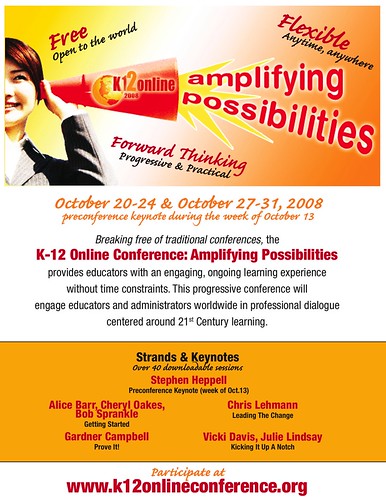The last seven days have been very busy for me, especially with presentations. Here are some of the highlights, and a few things to come.
Last Friday (Nov. 21/08), I presented Academic Integrity and the Culture of Sharing to instructors of the Faculty Certificate Program with SIAST (in Saskatoon). View slide deck.
On Saturday (Nov. 22/08), I presented on the use of technologies in the research process for the Learning From Practice conference. I created a wiki to support this presentation.
On Monday (Nov. 24/08), I co-presented with Dean Shareski on The New Interactive Classroom: Education, Teaching & Globalization for the Talking about School & Society series. Related to this, there was something quite interesting that happened earlier that day. My colleagues, Patrick Lewis and Marc Spooner, were interviewed for a local CBC Radio program called Blue Sky. While this was going on live, I asked people from Twitter to call in and ask questions and email the program. Before we knew it, we had calls from Virginia and Massachusetts, and an email was reported from Holland. Not bad for local radio, and I really have to want to do more with this idea. The radio program is well worth listening to, so here’s the link.
On Wednesday (Nov. 26/08), I spoke to a group of undergraduate students about social justice and technology. We were INCREDIBLY lucky to have had Howard Rheingold join us from California to speak about the concept of smart mobs and technology for political action/activism.. Howard is a pioneer of online communities, has been doing great stuff recently with the Social Media Classroom, and is one of my heroes. I put together a wiki to support this presentation as well.
On Thursday (Nov. 27/08), I presented from my office to Manitoba for Awakening Possibilities. I was joined by a list of terrific presenters as we were tasked with “5 minutes to make a difference.” These presentations have been archived, and are available here.
And now, after this busy week, it is time to switch gears as I will be leaving to Ukraine next week. A colleague and I are involved in the project “Youth Development of Democratic Citizenship” funded by a Partnerships for Tomorrow Phase II grant. My role will be to look at how technology can mediate long-term partnerships in the Ukraine, and focus on concepts of democratic media, digital citizenship, and social justice.
And when I get back … I have a week to finish my annual review forms, and write a chapter on the concept of open teaching.
I am happy (and lucky) to be busy … but I’m just a little stressed.











